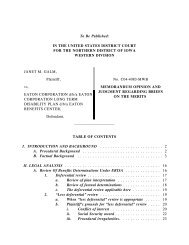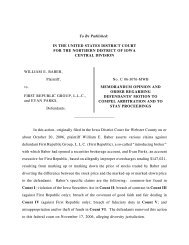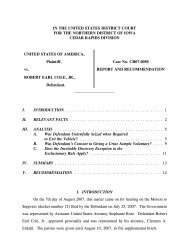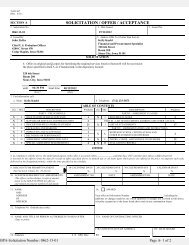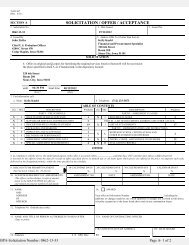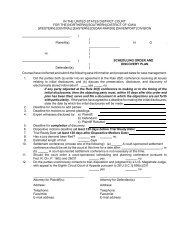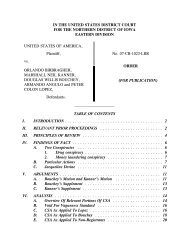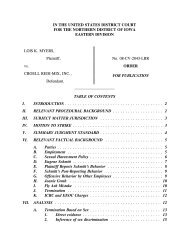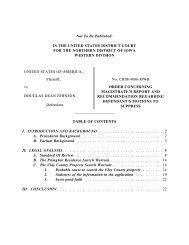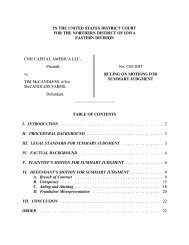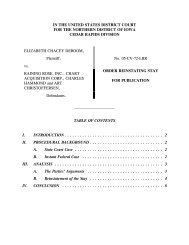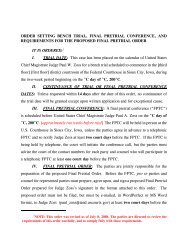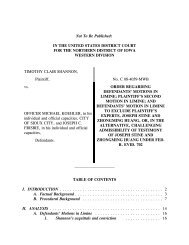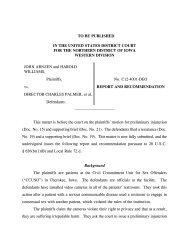Wagner v. Astrue - Northern District of Iowa
Wagner v. Astrue - Northern District of Iowa
Wagner v. Astrue - Northern District of Iowa
Create successful ePaper yourself
Turn your PDF publications into a flip-book with our unique Google optimized e-Paper software.
Not To Be Published:<br />
IN THE UNITED STATES DISTRICT COURT<br />
FOR THE NORTHERN DISTRICT OF IOWA<br />
CENTRAL DIVISION<br />
ROGER DEAN WAGNER,<br />
Plaintiff,<br />
vs.<br />
MICHAEL J. ASTRUE,<br />
Defendant.<br />
No. C 09-3074-MWB<br />
MEMORANDUM OPINION AND<br />
ORDER REGARDING PLAINTIFF’S<br />
APPLICATION FOR ATTORNEY<br />
FEES UNDER THE EQUAL ACCESS<br />
TO JUSTICE ACT<br />
____________________<br />
This case is before me on plaintiff Roger Dean <strong>Wagner</strong>’s May 1, 2012, Application<br />
For Attorney Fees under the Equal Access to Justice Act (“EAJA”) (docket no. 21), in<br />
which he requests $6,480.80 in attorney fees and $380.80 in expenses. Pursuant to<br />
sentence four <strong>of</strong> 42 U.S.C. § 405(g), I reversed and remanded this case for further<br />
proceedings on March 30, 2011, after concluding that the Commissioner’s decision that<br />
<strong>Wagner</strong> was not disabled was not supported by substantial evidence (docket no. 19). That<br />
same day, the Clerk <strong>of</strong> Court entered judgment in favor <strong>of</strong> <strong>Wagner</strong>. <strong>Wagner</strong> did not file<br />
his application for EAJA fees until May 1, 2012. The Commissioner argues in his May<br />
15, 2012, response (docket no. 22) that I should deny <strong>Wagner</strong>’s application for EAJA fees<br />
as untimely, as it was not filed within thirty days <strong>of</strong> the final judgment or, in the<br />
alternative, because <strong>Wagner</strong>’s requested fees are unreasonable. <strong>Wagner</strong> filed a reply<br />
(docket no. 23) on May 30, 2012, but <strong>of</strong>fers no explanation as to why he waited over a<br />
year after the judgment in this case to file his fee application.
In order to obtain an EAJA fee award, a prevailing party must submit its fee<br />
application “within thirty days <strong>of</strong> final judgment in the action.” 28 U.S.C. §<br />
2412(d)(1)(B). In social security cases such as this one, where the district court reverses<br />
and remands for further proceedings pursuant to sentence four <strong>of</strong> 42 U.S.C. § 405(g), “the<br />
[EAJA] filing period begins after the final judgment . . . is entered by the court and the<br />
appeal period has run, so that the judgment is no longer appealable.” Melkonyan v.<br />
Sullivan, 501 U.S. 89, 102 (1991) (citing 28 U.S.C. § 2412(d)(2)(G)). The period for<br />
filing an appeal, when the United States is a party to the case, is sixty days after the entry<br />
<strong>of</strong> judgment. See FED. R. APP. P. 4(a)(1)(B). Thus, once the Clerk <strong>of</strong> Court entered<br />
judgment in <strong>Wagner</strong>’s favor on March 30, 2011, <strong>Wagner</strong> had a total <strong>of</strong> ninety days to file<br />
his application for EAJA fees. Consequently, <strong>Wagner</strong>’s fee application, filed on May 1,<br />
2012, is untimely.<br />
The Eighth Circuit Court <strong>of</strong> Appeals has previously held that courts “lack<br />
jurisdiction to consider the merits <strong>of</strong> [EAJA] fee applications filed beyond this [thirty day]<br />
time limit.” Pottsmith v. Barnhart, 306 F.3d 526, 527 (8th Cir. 2002). However, the<br />
United States Supreme Court has since dispelled the notion that the EAJA’s timing<br />
requirement is “jurisdictional”:<br />
§ 2412(d)(1)(B) does not describe what classes <strong>of</strong> cases [a<br />
court] is competent to adjudicate; instead, the section relates<br />
only to postjudgment proceedings auxiliary to cases already<br />
within that court’s adjudicatory authority. Accordingly . . .<br />
the provision’s 30-day deadline for fee applications and its<br />
application-content specifications are not properly typed<br />
“jurisdictional.”<br />
See Scarborough v. Principi, 541 U.S. 401, 414 (2004) (citations and internal quotation<br />
marks omitted) (concluding that, where prevailing plaintiff timely filed an EAJA fee<br />
application but failed to allege that government’s position was not substantially justified,<br />
2
plaintiff’s corrected application, filed after thirty-day deadline, could relate back to the date<br />
<strong>of</strong> filing <strong>of</strong> the original application). Thus, pursuant to Scarborough, <strong>Wagner</strong>’s failure to<br />
meet the thirty-day filing deadline does not deprive me <strong>of</strong> jurisdiction to consider his EAJA<br />
fee application. Nonetheless, although I may consider his application, its untimeliness may<br />
serve as grounds for me to deny it. Scarborough did not reach the issue <strong>of</strong> whether the<br />
thirty-day EAJA deadline may be tolled for equitable reasons. See Scarborough, 541 U.S.<br />
at 421 n.8 (“Because our decision rests on other grounds, we express no opinion on the<br />
applicability <strong>of</strong> equitable tolling in the circumstances here presented.”); see also Sanchez<br />
v. <strong>Astrue</strong>, 273 F. App’x 686, 687 (9th Cir. 2008) (explaining that Scarborough “explicitly<br />
reserv[ed] the question <strong>of</strong> the applicability <strong>of</strong> equitable tolling in an EAJA fees dispute<br />
arising out <strong>of</strong> a disability benefits case”). Even assuming I may toll the thirty-day EAJA<br />
deadline, <strong>Wagner</strong> has <strong>of</strong>fered no explanation for his failure to file a timely EAJA fee<br />
application and, therefore, has presented no reasons, or equities that weigh in his favor,<br />
for me to find that equitable tolling is appropriate here. See Scarborough, 541 U.S. at 421<br />
n.8 (explaining that, in cases involving deadlines that may be equitably tolled, a party’s<br />
“‘garden variety claim <strong>of</strong> excusable neglect’” does not merit a court’s exercise <strong>of</strong> equitable<br />
tolling (quoting Irwin v. Dep’t <strong>of</strong> Veterans Affairs, 498 U.S. 89, 96 (1990))).<br />
Accordingly, I deny <strong>Wagner</strong>’s EAJA fee application as untimely. 1<br />
1 It appears that <strong>Wagner</strong> may have confused the deadline for filing an application<br />
for EAJA fees with the timing for moving for attorney fees under 42 U.S.C. § 406(b).<br />
<strong>Wagner</strong> indicates in his EAJA fee application that, following my decision to reverse the<br />
Commissioner’s decision and remand this case, the ALJ, on remand, found <strong>Wagner</strong> to be<br />
disabled. Without expressing any opinion as to whether I would grant a motion for<br />
§ 406(b) fees, I note that <strong>Wagner</strong> may wish to consider such a motion. My recent decision<br />
in Wellenstein v. <strong>Astrue</strong>, No. C 08-4098-MWB, 2011 WL 4963856 (N.D. <strong>Iowa</strong> Oct. 19,<br />
2011), explains the requirements for § 406(b) fees.<br />
3
THEREFORE, <strong>Wagner</strong>’s Application For Attorney Fees under the Equal Access<br />
to Justice Act (docket no. 21) is denied.<br />
IT IS SO ORDERED.<br />
DATED this 8th day <strong>of</strong> June, 2012.<br />
__________________________________<br />
MARK W. BENNETT<br />
U. S. DISTRICT COURT JUDGE<br />
NORTHERN DISTRICT OF IOWA<br />
4



